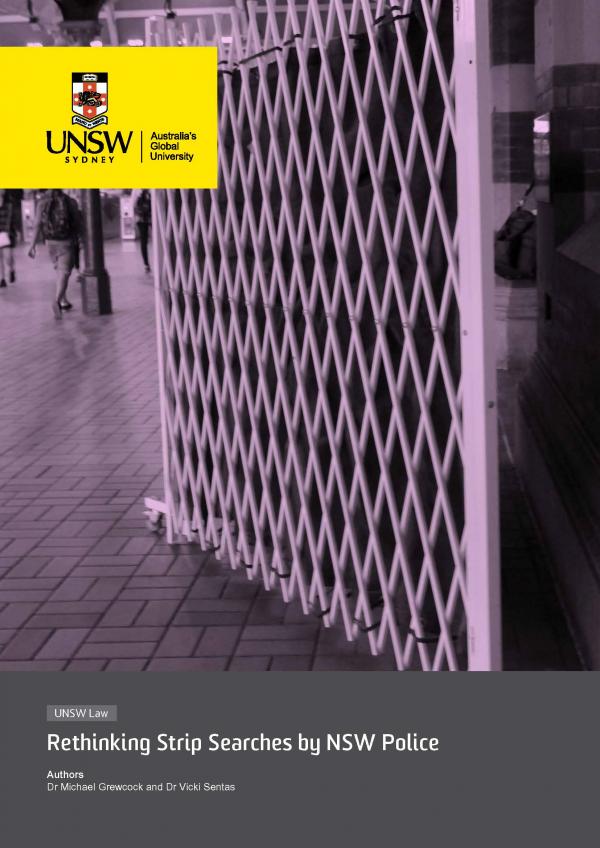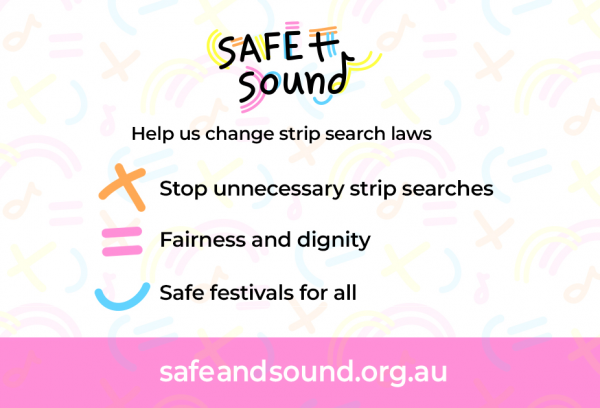 The Rethinking Strip Searches by NSW Police report, commissioned by RLC, and prepared by UNSW Law academics Dr Michael Grewcock and Dr Vicki Sentas, says that the law is failing to provide police with clear guidance on conducting this invasive search procedure.
The Rethinking Strip Searches by NSW Police report, commissioned by RLC, and prepared by UNSW Law academics Dr Michael Grewcock and Dr Vicki Sentas, says that the law is failing to provide police with clear guidance on conducting this invasive search procedure.
“A strip search is the most invasive form of personal search available to police without a court order,” Dr Sentas says. “Yet over the past decade we have seen the number of strip searches continue to rise. Our findings reveal such searches are doing little to tackle serious drug crime.”
Dr Sentas says the lack of publicly available data on strip searches, and on the exercise of police powers more broadly, is a major barrier to public accountability. “NSW Police are able to record and release comprehensive data on the use of strip searches, and it is in the public interest that they do so immediately, as a first step to achieving greater transparency and guidance to protect the public,” she says.
The first report of its kind in Australia, Rethinking Strip Searches by NSW Police looks at the operation of strip search laws across the country, exploring concerns around safeguards and transparency, and highlighting opportunities for law reform.
The report finds:
- Strip searches were used 277 times in the 12 months to 30 November 2006 compared to 5483 in the 12 months to 30 June 2018, an almost twentyfold increase in less than 12 years.
- Police suspicion that a person possesses prohibited drugs accounts for 91% of all recorded reasons why police conduct a strip search (2018-19 financial year).
- Unlawful strip searches are widespread
- Drug detection dogs may be propelling unnecessary strip searches
- Only 30% of strip searches in the field in the 2017/18 financial year resulted in a criminal charge
- Less than 16.5% of all charges arising from strip searches result in charges of drug supply
- Almost 82% of all charges are for personal possession of a prohibited drug
- Almost half (45%) of all recorded strip searches in the 2017/18 financial year were of young people aged 25 years and younger
- Aboriginal and Torres Strait Islander people accounted for 10% of all recorded strip searches in the field and 22% of all recorded strip searches in custody
- The law is failing to protect children from being searched
- Strip searches cause significant psycho-social harm
The report recommends:
- The law must be clearer about what, when and how police should conduct a strip search
- A strip search should be conducted in accordance with child protection principles
- Strip searches of children in the field should be prohibited unless permission is obtained through a court order
- The law should be clear that police cannot ever search genitals or breasts
- Examples of “private places” for strip searches should be clearly defined
Dr Michael Grewcock says that broadly defined thresholds in the law are a key cause of the increase in unlawful and unnecessary strip searches by police. “Our research suggests that NSW Police are using strip searches routinely with little regard for the law and their own internal guidelines,” Dr Grewcock says. “We need greater transparency and accountability regarding these practices.”
RLC police powers solicitor, Samantha Lee, says the extraordinary rise in strip searches signifies the law is not being applied as parliament intended – as a last resort. “Strip searches are an invasive, humiliating and harmful process, and as such, should be only used in exceptional circumstances when no other alternative is available,” Ms Lee says.
Dr Vicki Sentas says most strip searches yield nothing of evidential value but can have a traumatic effect on the person searched.
“Saturation policing with sniffer dogs at music festivals and railway stations or forcing teenagers to remove their clothes in the back of police vans does not make the community safer,” she says. “We need a serious discussion about how best to reform the law so that the police cannot abuse their powers.”
The UNSW report was commissioned as part of Redfern Legal Centre’s Safe and Sound campaign.

Download report


